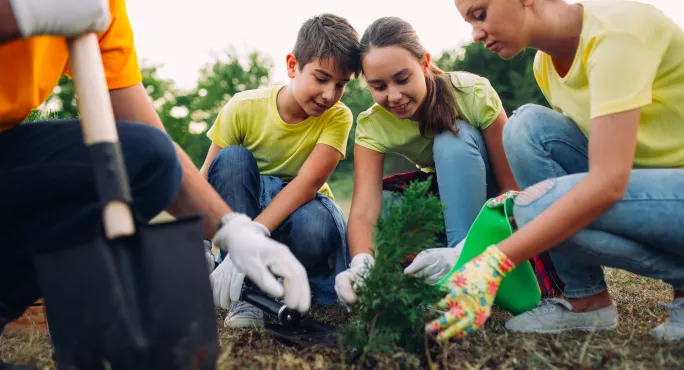- Home
- How to make IB service learning a whole-school focus
How to make IB service learning a whole-school focus

In these crazy times, it would be easy to turn inwards to focus on yourself and your immediate concerns. Self-preservation, after all, is an understandable response when facing an existential threat.
This is one of the reasons why, as a school community, we feel so strongly about focusing our year around the IB requirement for service learning.
Of course, everyone loves a bake sale, and our students have often been involved in ad hoc charity initiatives or actions connected to key dates in our calendar such as World Children’s Day.
A new whole-school approach
This is the first year, however, where we have started with a clearly articulated plan of service and action activities for all students and engaged them in their responsibilities towards others from the very start of term.
At the same time, we’re being more creative with our approach. With health and safety a primary concern, students have to stay distant in their ‘bubbles’ and face restrictions in terms of planning events and any activities involving the preparation or selling of food.
Our students have already become more attuned to local issues, taking their own initiative to start projects linked to refurbishing laptops for refugee-status children or collecting clothes for homeless charities.
Yes, these will often serve their own interests in terms of ticking off some CAS hours or fulfilling the Community Project requirement of the MYP, but it is heartwarming to see many students continue to dedicate their time and energy to these commitments, long past the date when they could have officially withdrawn.
Altruism feels good after all, and if we can instil in our young people a genuine desire to help others, the IB’s mission of developing “young people who help to create a better and more peaceful world” can arguably be met.
Community focus
By focusing on the learner profile “Caring” in an initial launch assembly, we engaged students in how they can demonstrate this attribute with a clear commitment to others.
Each of our four houses was given a local charity to fundraise for and students are currently coming up with proposals for how they will raise money over the course of this term.
Making connections with the chosen charities and asking their representatives to record a video message for our students was a great way to involve them in the specific causes, and by choosing charities that have a link to our school community, we ensured there was a commitment from the beginning, as well as a range of different endeavours linked to the environment, humanitarian aid, poverty and health.
Later in the year, students will be working within their year groups to plan more autonomous community action projects focused around the Sustainable Development Goals.
Although this project is still in its infancy, here are some things we’ve learned so far:
Lessons learned and tips for success:
- Connections - Students need to be given a chance to make personal connections with the community they are being asked to care about. Getting speakers to visit the school or record video messages to explain the work of the charity and what their fundraising will go towards can be a really powerful motivator. Allowing students to choose charities or communities to connect with can also help with initial engagement.
- Supervision - Have adults assigned to sign off any plans and ensure students are being realistic in terms of what they are planning to achieve.
- Define a clear outcome - A set time limit in order to complete an action and following an inquiry, planning, taking action and reflection model can be helpful in ensuring an outcome is achieved. Focusing on progress and process can also be helpful and ensure students don’t feel overwhelmed.
- Creativity - Be creative with options for virtual events and actions at a social distance and encourage students to come up with their own ideas within the parameters set.
- Monitoring engagement - Being able to reflect on the experience is a valuable experience in itself and finding opportunities to communicate with the wider community can also be helpful in celebrating success. This year, we will introduce a Service Award to our regular end-of-year award ceremony to recognise students who have been exceptional in this area.
By the end of the year, I hope we will have embedded the ethos and value of caring even further and that by being expected to take part in service experiences, students will feel more confident, as well as being more aware, of the part they can play in making a difference to other people’s lives.
Emily Hardwicke is assistant head (lower school), MYP coordinator and head of English at an international school in Switzerland
Keep reading for just £1 per month
You've reached your limit of free articles this month. Subscribe for £1 per month for three months and get:
- Unlimited access to all Tes magazine content
- Exclusive subscriber-only stories
- Award-winning email newsletters




